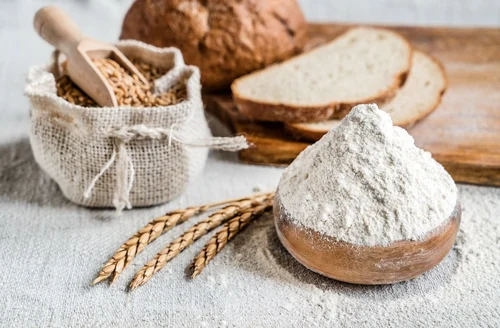
Choosing the appropriate bread flour is essential for the success of any bakery. The flour type selected will influence not only the flavour and texture of the bread but also the overall cost framework.
Given the various choices, ranging from bulk to retail, making a decision can be challenging.
Learn how to select between bulk bread flour purchase or retail alternatives, considering cost, quality, and supplier relationships. Additionally, discover the considerations you must take when choosing bread flour.
Understanding Bulk vs. Retail Flour Options
When sourcing bread flour for your bakery, you’ll primarily encounter two purchasing methods: bulk and retail. Retail alternatives generally consist of smaller, pre-packaged amounts, which are commonly available in grocery stores or speciality baking establishments. Bulk bread flour, on the other hand, is sold in larger portions, often by wholesale baking suppliers. The choice between these two largely depends on the scale of your operations and your specific baking needs.
Retail Flour Options
- Convenience: Retail flour is easy to purchase and doesn’t require a large upfront investment. It’s ideal for small bakeries or those just starting.
- Variety: You can access a wide range of speciality flours, allowing for experimentation with different types of bread.
- Cost: Retail flour is generally more expensive per kilogram than bulk options. This expense can add up quickly, especially if your bakery has a high production volume.
Bulk Flour Options
- Economies of Scale: Buying bread flour in bulk significantly reduces the cost per kilogram, making it the preferred option for larger bakeries.
- Consistency: When you buy bread flour in bulk, you’re likely sourcing from a single batch, ensuring consistent quality across all your products.
- Storage Considerations: Bulk purchases require adequate storage facilities to maintain the flour’s freshness and quality.
ALSO READ: 5 Healthier Baking Trends Your Bakery Needs to Consider Incorporating

Key Factors to Consider When Choosing Bread Flour
- Quality and Protein Content
The protein content of bread flour is a critical factor that determines the texture and rise of the bread. Higher protein flours, often known as bread flours, contain more gluten, which is essential for creating the desired structure in bread. Whether you are purchasing retail or bulk bread flour, ensure that the flour meets the quality standards required for your bakery’s specific products.
- High-Protein Flours: Ideal for bread with a chewy texture, such as sourdough or baguettes.
- Lower-Protein Flours: Suitable for softer bread, like brioche or dinner rolls.
- Cost Efficiency
Cost is a primary factor in any business decision. While retail flour is easier to manage in smaller quantities, buying bulk bread flour is generally more cost-effective for bakeries with a high production rate. Consider the long-term savings associated with bulk buying when purchasing wholesale baking supplies. Although the initial cost is higher, the per-unit price is significantly lower, contributing to better profit margins.
- Supplier Relationships
Building a solid relationship with baking suppliers can have long-term benefits for your bakery. Suppliers who offer wholesale baking supplies provide more than just the product—they can offer advice, bulk discounts, and priority access to high-quality ingredients. Establishing a reliable supply chain is critical for maintaining consistent product quality and meeting production deadlines.
- Local Suppliers: Collaborating with local suppliers has the potential to decrease both shipping expenses and delivery times.
- Reputation: Choose suppliers known for their reliability and quality products. This approach can reduce the risk of receiving substandard flour.
- Versatility of Bakery Mixes
Using a bakery mix can be a sound option for bakeries looking to streamline their operations. A bakery mix typically combines flour with other necessary ingredients, providing a consistent base for various products. While some may argue that this approach limits creativity, it can significantly reduce preparation time and ensure consistency across batches.
- Consistency: Bakery mixes ensure uniformity in your products, which is critical for customer satisfaction.
- Time-Saving: Reduces the need for measuring and mixing multiple ingredients, speeding up the baking process.
- Customisation: Some wholesale baking suppliers offer customisable bakery mixes tailored to your needs.
Bulk vs. Retail: Which is Right for Your Bakery?
Choosing between bulk and retail options depends on the size of your bakery and your production needs. Small bakeries or those in the early stages of development may discover that retail flour provides greater flexibility and a broader range of options essential for experimenting with various recipes. However, as your production scales up, the cost savings and consistency offered by bulk bread flour become increasingly attractive.
- Small Bakeries: Retail flour is ideal for those with limited storage space and lower production volumes.
- Large Bakeries: Bulk bread flour is more cost-effective and ensures consistency across large batches, making it the preferred choice for established bakeries with high production demands.
Conclusion
Selecting the appropriate bread flour for your bakery requires careful consideration of various factors, including quality, pricing, and supplier relationship. Whether you choose to purchase bread flour in bulk or select retail alternatives, it is essential to ensure that your decision aligns with your bakery’s unique requirements and production capacity. This approach will help guarantee the consistent production of high-quality bread while also preserving a satisfactory profit margin.
Contact Prima Flour and let us provide you with everything you need to enhance your baking operations.




